First Lesson at Wake Forest: Building Community
For the class of 2020, Wake Forest has a vision for building community from students’ first days on campus.
With its most diverse student body ever, the University has increased opportunities this year for incoming students – from 45 states and 24 countries – to cross cultural, political, racial and social boundaries and lay the foundation for the friendships and academic exploration that make a college community strong.
About 20 miles up the road from Wake Forest is the small town of Walnut Cove, N.C., where Nicole Rogers grew up. Approximately the same number of people make up this rural community as make up the group of 1,300 first-year students who moved into Wake Forest residence halls on Friday, Aug. 26.
Nicole, who works on her family’s 180-acre strawberry farm doing everything from fieldwork to website design, met her roommate from Le Vesinet, France, on move-in day. These two new students are joining a group of undergraduates with an endless mix of backgrounds, personalities, interests, ethnicities, and beliefs.
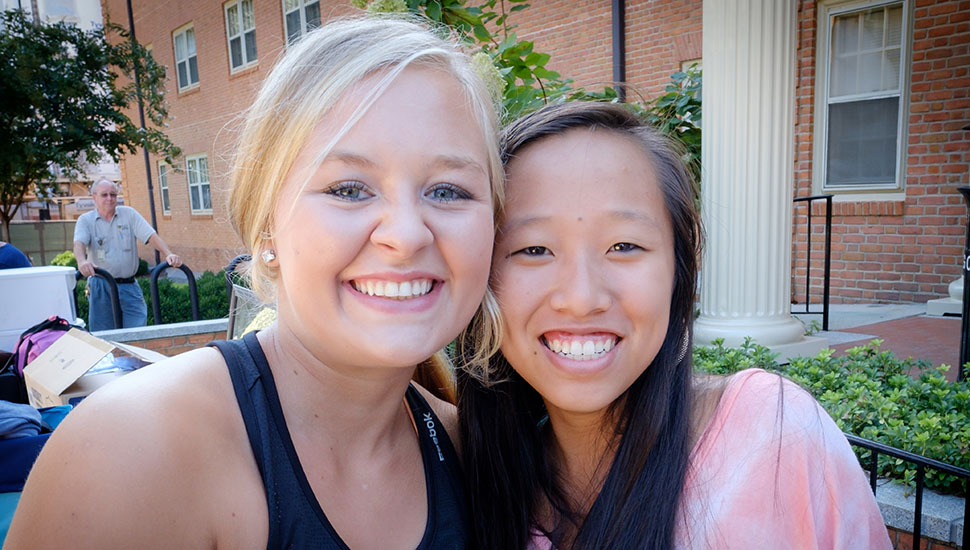
Wake Forest’s emphasis on community is intentional, continuous and timely. After a summer marked by intense political divisiveness, deadly gun violence and strained racial tensions, University leaders are urging students to begin the semester by engaging across difference.
“Our strength as a campus community – and as a nation – rests on our ability to listen to the voices of others and learn from experiences different from our own,” said Wake Forest President Nathan O. Hatch. In an email this summer, he advised students: “Start a conversation. Do the hard work of dialogue with those with whom we disagree. We all need occasions to frame challenging conversations and methods to facilitate those discussions.”
“A college campus must foster honest, face-to-face conversation, however difficult, in the classroom, in residence halls and on structured and unstructured occasions.” Wake Forest President Nathan O. Hatch
When Kai Jordan of Westchester, N.Y., moved into Collins Residence Hall, she did not know how close her own philosophy would be to President Hatch’s. When asked why she chose Wake Forest, she warmly said, “I wanted to go somewhere far from home to experience something new and meet different people. I plan on leaving my door open a lot so people can stop in and say ‘hi.’”
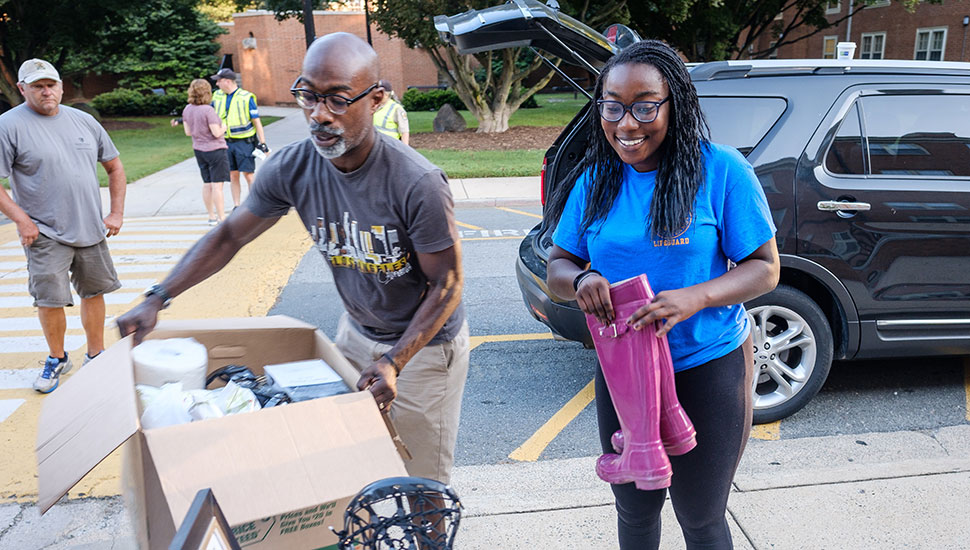
Community starts on move-in day
When students arrived on campus Friday, they were welcomed by professors. Wake Forest Faculty Fellows work closely with first-year residents throughout the academic year, creating programs, hosting dinners and offering advice in their assigned residence halls. To increase faculty-student engagement, especially outside of the classroom, the professors provide opportunities for intellectually engaging discussions.
“As the diversity of Wake Forest increases, there is always the threat that students will self-segregate within the residence halls,” said English professor Melissa Jenkins, who is in her second year as a Faculty Fellow. “Sustained efforts from Faculty Fellows can help break through at least some of the bubbles that divide different groups of students.”
Data collected over the three years since the Faculty Fellows program was launched suggest consistent, across the board gains in students’ sense of belonging, confidence and experience of openness.
Gathering spaces for conversations
In a world where 90 percent of college-age adults use social media, according to a 2015 Pew Research Center study, Wake Forest is committed to providing dedicated spaces that foster face-to-face conversations.
The University’s Intercultural Center, LGBTQ Center and Women’s Center have a new home in the center of campus on the main floor of Benson University Center. With comfortable furniture and photos of many different Wake Foresters that represent a wide cross-section of students, the renovated space is welcoming and perfect for casual gatherings, deep discussions and campus presentations.
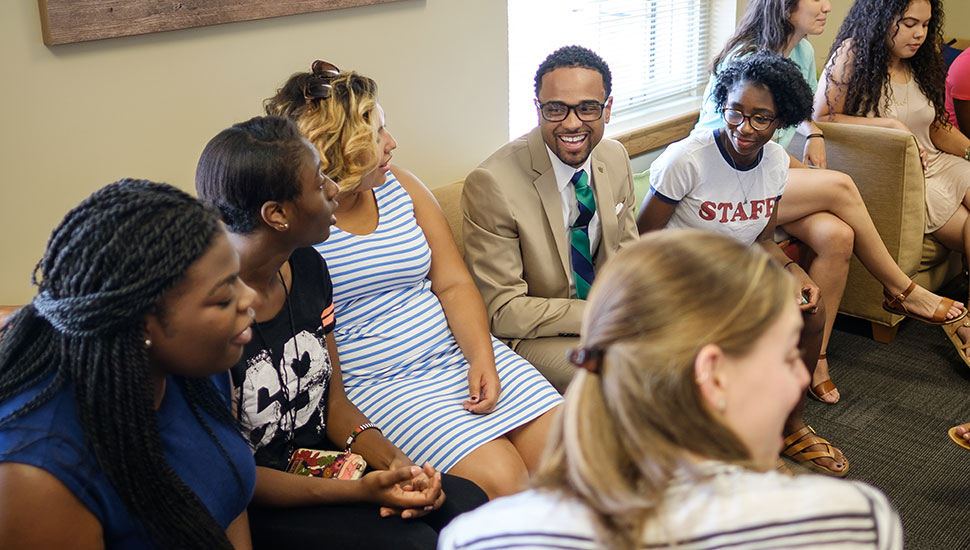
The Intercultural Center, formerly known as the Office of Multicultural Affairs, reflects the office’s expanded scope as Wake Forest welcomes more diverse and international students.
The Center collaborates with campus life, student engagement, global programs and studies, and the Office of Diversity and Inclusion to help provide resources and support as students, faculty and staff acknowledge and address the challenging issues of race and inclusion on campus.
Both the LGBTQ Center, which recently celebrated its fifth anniversary, and Women’s Center, in its fourth year, now have larger lounge spaces for students, faculty and staff to gather for programs.
“The third floor of Benson is becoming the involvement floor with the Intercultural Center, LGBTQ Center, Women’s Center and Office of Student Engagement within steps of each other,” said Jonathan McElderry, known as Dr. J, assistant dean of students and director of the Intercultural Center. “Being in the same area complements the work we do together.”
Citizenship before classes start
As part of Project Wake: Citizenship, participating students chose from more than 30 books to read over the summer. The books became springboards for small group conversations among students, faculty and staff on what citizenship means for individuals, and for members of a local, national and global community.
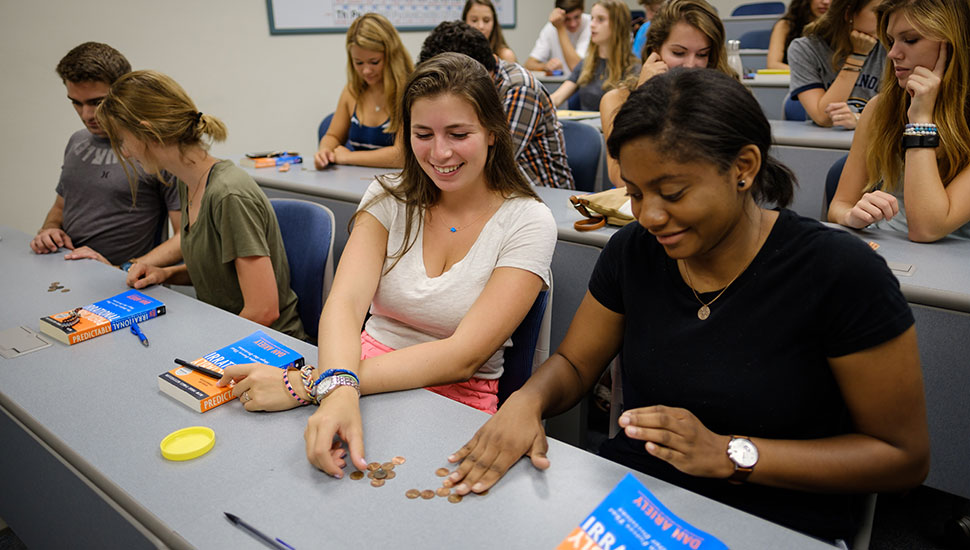
Katherine Quinn, a first-year student from Jamestown, N.C., chose to read “Fun Home: A Family Tragicomic” as part of Project Wake. Quinn has two families. She was adopted by her U.S. family when she was five but maintains a close relationship with her family in Vietnam. Angela Mazaris, director of the University’s LGBTQ Center, used this book as a way to discuss what it means to look back on our own families, homes and histories while transitioning from high school to college.
“We discussed how relationships impact our identity,” said Quinn. “We talked about how we related to the book, which led to the group opening up and sharing our stories.”
Dylan Brown, from Colorado Springs, Colo., participated in Building University Inclusion and Leadership through Diversity (BUILD), an optional week-long pre-orientation immersion program to introduce first-year students to concepts of social justice, intercultural communication and social change. “Because I came from an environment without a lot of diversity, I wanted to learn more about reaching across and engaging with others different than me,” said Brown. “My best friend was one of the few African-Americans in my high school and this relationship inspired me to be an ally for social justice. By engaging with people different than myself, I hope to inspire others to embrace diversity across campus.”
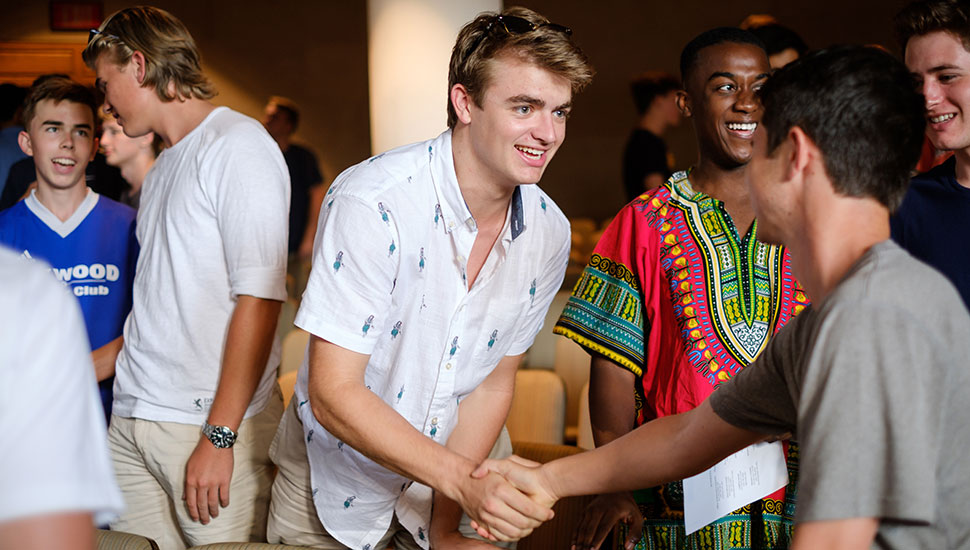
“According to The New York Times, Wake Forest is among the 10 fastest changing universities in the country in terms of economic diversity. First-year student enrollment by ethnicity also reflects an increasingly diverse student body.”
Be curious and open-minded
In a required orientation session organized by Director of Diversity Education Shayla Herndon, first-year students filled Wait Chapel to hear from campus life leaders about the importance of a strong and diverse community.
Chief Diversity Officer Barbee Oakes set the tone for the group conversations and activities that were part of the program. “Leverage your differences. Do not just tolerate them. This will help you create the kind of community you want to live in here at Wake Forest and prepare you for the world you will enter after graduation.”
“Citizenship is about being a part of a community, it is not about being a voter inside a particular landscape,” said Melissa Harris-Perry, Maya Angelou Presidential Chair of Politics. “Push yourself to have hard conversations, read books by people who are different from you, get into classrooms where you are not certain you can get an A and get out of the classroom to learn with one another and in the community.”
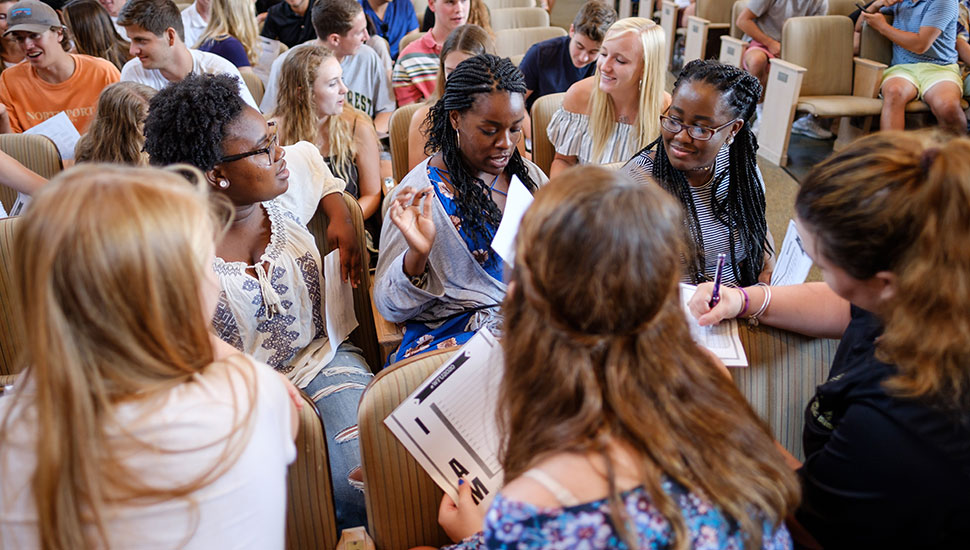
Students completed an “I am, but I am not” worksheet and shared the results with those sitting around them — an exercise designed to get students talking about stereotypes and assumptions.
They also shared words to describe times when they felt or experienced exclusion based on one of the items on their list, as well as words to describe times when they felt included.
“We may come from different parts of the world and have had different experiences,” said Penny Rue, vice president for campus life, “but we all know what it’s like to feel sadness, loneliness and fear, or joy, pride and confidence. Emotional connections make for common ground.”
Upcoming Events
- Intercultural Center presents World Cultural Festival on Sept. 16 from 5:30 to 8 p.m.
- LGBTQ Center’s Safe Zone Workshops for faculty, staff, and students
- The Women’s Center presents TGIFeminism every Friday at noon, starting Sept. 2.
- The Leadership Project with Eboo Patel, emphasizing importance of interfaith leadership and dialogue in the 21st century on Oct. 5.
- Open House for the Intercultural Center, Women’s Center, LGBTQ Center on Nov 4.
- Called Together: The Prayers of the People, is a weekly prayer service held on Wednesdays at noon in Davis Chapel to address crises and traumatic events that happen worldwide. Each week the service is led by a particular faith tradition but all faith practices are welcomed.

